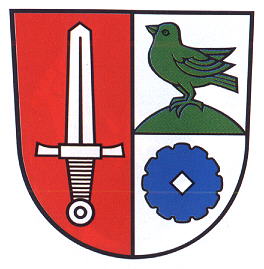Vogelsberg: Difference between revisions
Jump to navigation
Jump to search
Knorrepoes (talk | contribs) No edit summary |
Knorrepoes (talk | contribs) m (Text replace - "|width="15%"|50 px|right |}" to "|width="15%"|50 px|right |}<seo title="Wappen, Gemeindewappen" />") |
||
| Line 3: | Line 3: | ||
|width="70%" align="center" |'''Heraldry of the World<br/>Civic heraldry of [[Germany]] - [[Deutsche Wappen|Deutsche Wappen (Gemeindewappen/Kreiswappen)]]''' | |width="70%" align="center" |'''Heraldry of the World<br/>Civic heraldry of [[Germany]] - [[Deutsche Wappen|Deutsche Wappen (Gemeindewappen/Kreiswappen)]]''' | ||
|width="15%"|[[File:Germany.jpg|50 px|right]] | |width="15%"|[[File:Germany.jpg|50 px|right]] | ||
|} | |}<seo title="Wappen, Gemeindewappen" /> | ||
'''VOGELSBERG''' | '''VOGELSBERG''' | ||
Revision as of 18:46, 5 November 2012
| Heraldry of the World Civic heraldry of Germany - Deutsche Wappen (Gemeindewappen/Kreiswappen) |
VOGELSBERG
State : Thüringen
District (Kreis) : Sömmerda
Origin/meaning: The arms were officially granted on May 5, 1995.
The green bird (Vogel) on a mountain (Berg) is a canting element, which already appeared on the local seals from the 18th century. The sword refers to the court which was held in the village for several centuroes.
The wheel refers to the production of the blue dye (indigo) from the woad plant (Isatis tinctoria) in the village. The plants were cultivated and the dye was pressed using the wheel seen in the arms.
Literature : Ulle, 1998

